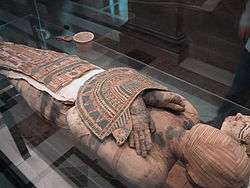Definify.com
Definition 2026
木乃伊
木乃伊
Chinese
| tree; wood | to be; thus; so; therefore; then; only; thereupon
|
he; she; (surname); Iraq (abbrev.); Iran (abbrev.)
|
||
|---|---|---|---|---|
|
simp. and trad. (木乃伊) |
木 | 乃 | 伊 | |
Noun
木乃伊
- a mummy (embalmed corpse)
Japanese

木乃伊 (mīra): a mummy on display at the Louvre.
| Kanji in this term | ||
|---|---|---|
| 木 | 乃 | 伊 |
| Grade: 1 | Jinmeiyō | Jinmeiyō |
| Irregular | ||
Etymology
From Portuguese mirra (“myrrh, skeleton, mummy”)[1][2][3][4] or Dutch mirre (“myrrh”).[1]
The kanji spelling 木乃伊 is an example of jukujikun. This spelling was borrowed from Chinese 木乃伊 (mùnǎiyī, “mummy”)[1][4][2][5]. Some Japanese sources[1][4][2][5] suggest that the Chinese term was a transliteration of Dutch mummie (with some stated concern that this derivation is doubtful[5]), but it appears that the Dutch and Chinese terms are unrelated. See the Chinese entry for more.
Alternative forms
- ミイラ (a more common modern spelling)
Pronunciation
Noun
木乃伊 (hiragana みいら, katakana ミイラ, romaji mīra)
- a mummy, deliberately preserved, such as those found in the ancient tombs of Egypt or China
- a human or animal corpse mummified naturally, such as in a peat bog or desert
Derived terms
- 木乃伊取りが木乃伊になる (mīra tori ga mīra ni naru)
References
- 1 2 3 4 1988, 国語大辞典(新装版) (Kokugo Dai Jiten, Revised Edition) (in Japanese), Tōkyō: Shogakukan
- 1 2 3 1995, 大辞泉 (Daijisen) (in Japanese), Tōkyō: Shogakukan, ISBN 4-09-501211-0
- ↑ 1998, 広辞苑 (Kōjien), Fifth Edition (in Japanese), Tōkyō: Iwanami Shoten, ISBN 4000801112
- 1 2 3 4 2006, 大辞林 (Daijirin), Third Edition (in Japanese), Tōkyō: Sanseidō, ISBN 4-385-13905-9
- 1 2 3 1997, 新明解国語辞典 (Shin Meikai Kokugo Jiten), Fifth Edition (in Japanese), Tōkyō: Sanseidō, ISBN 4-385-13143-0
- ↑ 1998, NHK日本語発音アクセント辞典 (NHK Japanese Pronunciation Accent Dictionary) (in Japanese), Tōkyō: NHK, ISBN 978-4-14-011112-3
- ↑ 1997, 新明解国語辞典 (Shin Meikai Kokugo Jiten), Fifth Edition (in Japanese), Tōkyō: Sanseidō, ISBN 4-385-13143-0